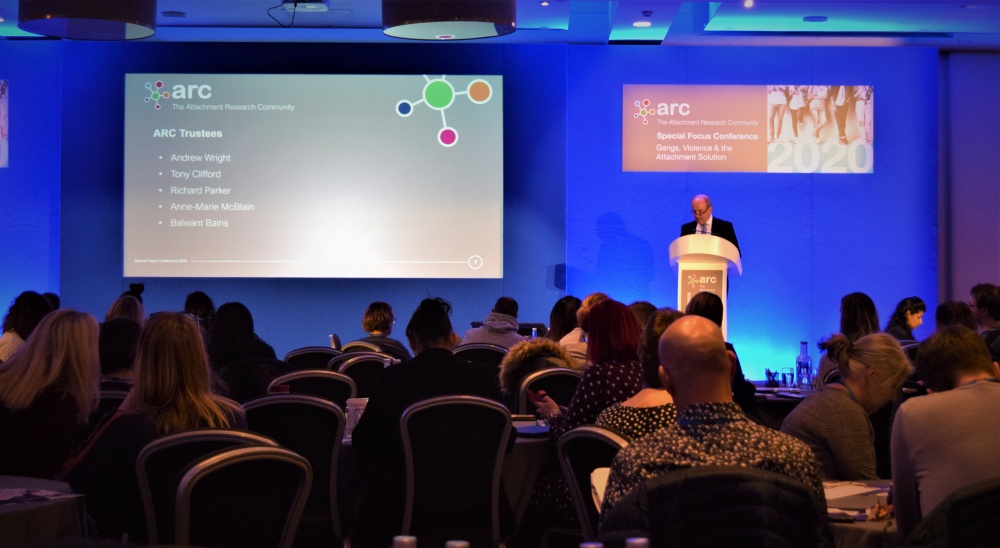
On Tuesday 10th March 2020, ARC held its first special focus conference, Gangs, Violence and the Attachment Solution. The day was a great success, enabling delegates to consider varying perspectives on a topic that has become a growing concern for schools and settings.
Due to Covid-19 our first keynote speaker, Dr Duncan Bew, was unable to attend, as his expertise was needed back in London. We were delighted that Zubeda Limbada, from Connect Futures, was able to step in and provide a fascinating perspective on contextual safeguarding based on her extensive work with young people at risk and those who work with them. Zubeda’s approach started with helping us to understand the challenging contexts young people find themselves in. She spoke of practical ways in which all of us can tackle this subject based on this overall understanding, exploring how delegates can ask themselves simple questions in order to see things from the young person’s situation and experience and build attachments that can develop in young people the resilience to find better, positive pathways.
We were fortunate that Dr Lola Abudu, Deputy Director of Health and Wellbeing, Public Health England, West Midlands Centre, was able to join us. Dr Abudu explored the relationships between adverse childhood experiences, unmet attachment needs and youth violence. Dr Abudu described these factors as analogous to the conditions that create other health crises, a perspective that helped delegates to see young people being drawn into violence and extremism within a wider system, rather than as a series of isolated incidents. From this perspective, the absence or presence of a network of secure attachment relationships and the resilience this can create is clearly very significant. She described how multi agency and multidisciplinary approaches are essential to tackling the root causes of violence and mitigating the impacts on individuals and communities who are experiencing it in all its forms. Dr Abudu challenged the audience to consider early intervention and how early years providers, primary schools and other educational settings can make their contribution to these efforts and make a real difference for those with increased vulnerability as victims and perpetrators.
Simeon Moore, a writer, musician and advocate for young people, opened the afternoon session. As an ex-gang member, Simeon drew on his personal experience and his life journey to show how poor environmental factors and negative mental programming affect young people and become the driving force behind gang culture, youth violence and knife crime. He also described to delegates how he was able to turn his life around and the positive factors which allowed him to do so. Simeon’s presentation helped to draw together in one powerful narrative many of the themes from our first two speakers.
As part of the day, delegates were also able to explore Poster Presentations from various projects that are currently taking place and are proving to be effective. The dedicated time available during the day allowed delegates to have an opportunity to talk to those already working within projects in order to find a solution suitable to their own situation. Projects included:
Building Resilience Project Stoke on Trent – Supporting Families Against Youth Crime,
Can psychological models support schools in contextual safeguarding around youth violence? Dr Dipak Choudhury, Warwickshire Educational Psychology Service,
Identifying those at risk of joining gangs & offering diversion opportunities from Wolverhampton Police and School Partnerships,
Stoke City Football Club’s violence reduction programme,
How can community-based organisations help prevent young people becoming involved with gangs and crime? From Visyon,
Dudley ‘627’ Pilot Project, Dudley Integrated Violence and Exploitation Reduction Team (D.I.V.E.R.T) Dr Aaron Anderson
An overlap? Contextual safeguarding: extremism and gangs with Zubeda Limbada - Director, Connect Futures
Andrew Wright, ARC Chair, said; "Our first special focus conference was a huge success. The differing perspectives that all our speakers and poster presenters were able to provide offered an insight into the effects and realities of gang membership for young people. The day was about exploring different approaches and encouraging delegates to think creatively about how to approach their situation and I feel we achieved that.”
He went on to say "This topic doesn’t seem to be going away anytime soon and we are now looking into how we can take this to other parts of the country in order to help and support those who are attempting to work with young people.”